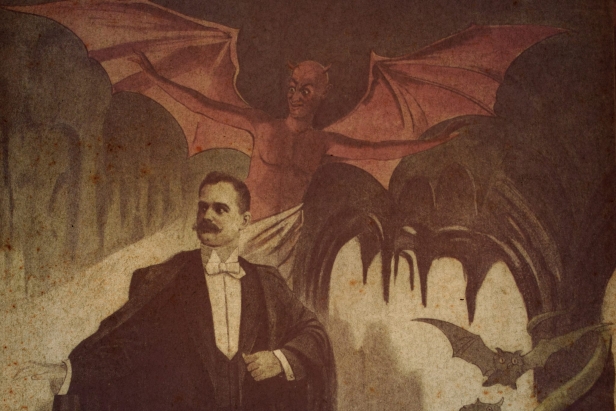NB: This review contains what some would consider to be spoilers, a situation which is very difficult to avoid with this particular film.
Like watching La Rage Du Demon, you read this review at your own risk.
In 2012, film collector Edgar A Wallace invited filmmakers and journalists to a very special screening of a very rare film. No one was told what it would be, simply that it was a work from 1897 that had been lost. The film was La Rage Du Demon, and the result was mass violent hysteria, as all who saw the footage temporarily lost their minds. After everyone escaped and Wallace was arrested, the film somehow disappeared.
But what is the story behind the film? Was it, as some believe, one of the many long-lost works by master filmmaker Georges Méliès? Or a work of occult evil by his scorned protégé? How could a film drive people to madness?
Fabien Delage has assembled an impressive roster of talking heads for his film, which played at the Fantasia Film Festival, including directors like Christophe Gans (Brotherhood Of The Wolf), Alexandre Aja (High Tension), critics like Philippe Rouyer, and even Méliès’ great-great-granddaughter Pauline Méliès. There’s archive footage, strong narration, and a tale that is absolutely captivating for cinephiles and genre fans: a film that has not only been lost for over a century, but also has the power to drive rational people to insanity.
It is, of course, a work of fiction, and this is a mockumentary (hence the slightly odd spoiler warning), but Delage has done an incredible job of creating a po-faced, convincing tale that you’ll struggle to remember that none of this is real. There are one or two minor slip-ups with the footage and a couple of slightly less convincing experts, but even those are presented with such sincerity that it’s hard to tell whether you’re simply being overly critical.
With a running time of just 60 minutes, Delage keeps things moving at a brisk pace and never lingers on anything long enough for doubt to set in, and knows which talking heads to lean on most, and which to use for quick bursts of unimpeachable expertise (really, who’s going to doubt the word of Pauline Méliès?). And what really cements both the illusion and the enjoyment is the sincere respect and love that Delage and his experts have for the work of Méliès and the earliest filmmakers, the sheer power that their films had over their audience and which cinema continues to wield, and the warm glow that comes from watching just a moment of footage from his efforts.
The appeal of La Rage Du Demon may be somewhat limited, and at times it does feel a little like an exercise, but it’s as much a celebration as it is a sleight of hand, and an engrossing and entertaining one at that.
